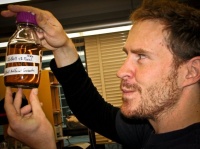CAZypedia celebrates the life of Senior Curator Emeritus Harry Gilbert, a true giant in the field, who passed away in September 2025.
CAZypedia needs your help!
We have many unassigned pages in need of Authors and Responsible Curators. See a page that's out-of-date and just needs a touch-up? - You are also welcome to become a CAZypedian. Here's how.
Scientists at all career stages, including students, are welcome to contribute.
Learn more about CAZypedia's misson here and in this article. Totally new to the CAZy classification? Read this first.
User:Jan-Hendrik Hehemann
Short CV
I studied biochemistry and molecular biology at the University of Hamburg (Germany) and graduated in 2005.
In 2006 I received an early stage Marie Curie fellowship to start a PhD, with Dr. Mirjam Czjzek at the Station Biologique de Roscoff (France).
2010-2012; postdoctoral fellow (EMBO) in the lab of Alisdair Boraston at the University of Victoria (Canada).
2012-2014; postdoctoral fellow (HFSP) in the lab of Martin Polz at MIT (USA).
2015-ongoing; Research Group Leader at the Marum and the Max Planck Institute for Marine Microbiology in Bremen (Germany)
Research Interests
I am generally interested in organic matter degradation in the sea and how marine bacteria degrade algal polysaccharides. In addition I am interested in the evolution of human gut microbes and how they adapt to our changing diets.
Previous research - "The Sushi Factor"
During my PhD I worked on glycoside hydrolases from the marine flavobacterium Zobellia galactanivorans that are specific for cell wall polysaccharides from red algae. I focused on a new subfamily in GH16, of which the specificity was unknown, and discovered that they are beta-porphyranases. These enzymes degrade the polysaccharide porphyran from red seaweeds like Porphyra sp., which is more generally known as Nori, and used to make one of my favourite foods: the Maki-Sushi roll.
When we searched for other porphyranases in public sequence databases, we found them solely in genomes of marine bacteria - and not in terrestrial bacteria - probably because porphyran is an algal polysaccharide and is thus absent in land plants. However, we found one notable exception: one porphyranase was encoded in the genome of Bacteroides plebeius, a human gut bacterium that was isolated from a Japanese individual.
A subsequent analysis of available gut metagenome datasets revealed that porphyranases are common in gut bacteria from Japanese people and so far absent in others. We suggested that the consumption of fresh, non-sterile, food with associated bacteria - “The Sushi Factor” - created contact between the human gut and bacteria from the ocean, which led to the horizontal transfer of porphyranase genes [1]. This research was widely covered in the press; you can find a great and more palatable article about our paper here.
